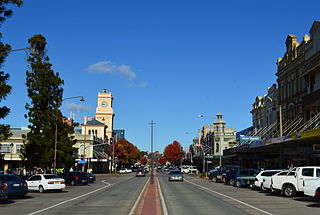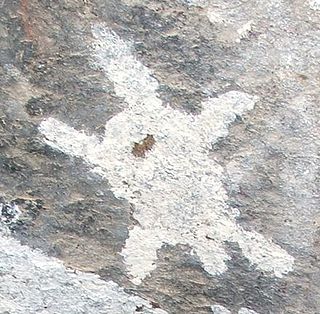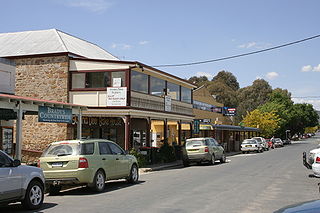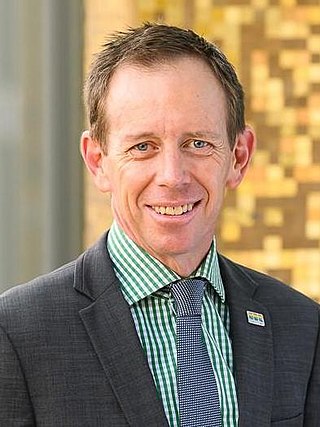Related Research Articles

The Australian Capital Territory (ACT), known as the Federal Capital Territory (FCT) until 1938, is a federal territory of Australia. Canberra, the capital city of Australia, is situated within the territory, and serves as the territory's primate city. It is located in southeastern Australian mainland as an enclave completely within the state of New South Wales. Founded after Federation as the seat of government for the new nation, the territory hosts the headquarters of all important institutions of the Australian Government.

Canberra is the capital city of Australia. Founded following the federation of the colonies of Australia as the seat of government for the new nation, it is Australia's largest inland city and the eighth-largest Australian city overall. The city is located at the northern end of the Australian Capital Territory at the northern tip of the Australian Alps, the country's highest mountain range. As of June 2023, Canberra's estimated population was 466,566.

Goulburn is a regional city in the Southern Tablelands of New South Wales, Australia, approximately 195 kilometres (121 mi) south-west of Sydney and 90 kilometres (56 mi) north-east of Canberra. It was proclaimed as Australia's first inland city through letters patent by Queen Victoria in 1863. Goulburn had a population of 24,565 as of the 2021 census. Goulburn is the seat of Goulburn Mulwaree Council.

Lake George is an endorheic lake in south-eastern New South Wales, Australia. It is approximately 40 kilometres (25 mi) north-east of Canberra located adjacent to the Federal Highway en route to Goulburn and Sydney. Lake George is also the name of a locality on the western and southern edges of the lake, within the area of the Queanbeyan–Palerang Regional Council.
The history of Canberra details the development of the city of Canberra from the time before European settlement to the city's planning by the Chicago architect Walter Burley Griffin in collaboration with Marion Mahony Griffin, and its subsequent development to the present day.

Belconnen is the most inner suburb of the larger district of Belconnen in Canberra, Australia. Sharing its name with the larger district which encapsulates it, the suburb is surrounded with well developed infrastructure, and planning which allows it sunset views from the Brindabellas on its western side. The suburb contains important amenities for the District of Belconnen including the Belconnen Town Centre and Lake Ginninderra as well as its own well populated residential areas. It is bounded by Ginninderra Drive, Aikman Drive, Eastern Valley Way, Belconnen Way and Coulter Drive. It has a number of parks such as Margaret Timpson Park, Eastern Valley Oval and on the foreshores of Lake Ginninberra, Diddams Close Park and John Knight Memorial Park.

Dunlop is a suburb of the Belconnen district of Canberra, located within the Australian Capital Territory, Australia. Dunlop is at the far north-west edge of Canberra, near the border with the state of New South Wales. Approximately 11.6 kilometres (7.2 mi) north-west of the city, Dunlop is next to the suburbs of Fraser, Charnwood and Macgregor. At the edge and within Dunlop lies the Canberra Nature Park called Dunlop Grasslands Nature Reserve, West Belconnen Ponds, Jarramlee Pond and Fassifern Pond which are part of the Ginninderra Catchment.

Lawson is a suburb in the Belconnen district of Canberra, located within the Australian Capital Territory, Australia. The suburb is surrounded by Baldwin Drive, Gundaroo Drive and Ginninderra Drive. It lies next to the suburbs of McKellar, Giralang, Kaleen, Bruce and Belconnen.

Weetangera is a suburb in the Belconnen district of Canberra, located within the Australian Capital Territory, Australia. The suburb covers an area of approximately 158 hectares. Located approximately 10 kilometres (6.2 mi) north-west of the city, Weetangera is bounded by Springvale Drive to the south and west, Coulter Drive to the east and Belconnen Way to the north. The Pinnacle Nature Reserve, a Canberra Nature Park is adjacent to the south of the suburb, across Springvale Drive.

The Ngunnawal people, also spelt Ngunawal, are an Aboriginal people of southern New South Wales and the Australian Capital Territory in Australia.
Ngunnawal/Ngunawal and Gundungurra are Australian Aboriginal languages, and the traditional languages of the Ngunnawal and Gandangarra. Ngunnawal and Gundungurra are very closely related and the two were most likely highly mutually intelligible. As such they can be considered dialects of a single unnamed language, but this is the technical linguistic usage of these terms and Ngunnawal and Gundungurra peoples prefer to describe their individual varieties as separate languages in their own right.

Bungendore is a town in the Queanbeyan Region of New South Wales, Australia, in Queanbeyan-Palerang Regional Council. It is on the Kings Highway near Lake George, the Molonglo River Valley and the Australian Capital Territory border. It has become a major tourist centre in recent years, popular with visitors from Canberra and some of it has heritage protection. It has expanded rapidly in recent years as a dormitory town of Canberra.

Ginninderra Creek, a partly perennial stream of the Murrumbidgee catchment within the Murray–Darling basin, is located in the Capital Country region spanning both the Australian Capital Territory and New South Wales, Australia.
Mary Edith Porter is a former Labor member of the ACT Assembly. She was first elected to the Assembly in October 2004. Immediately prior to that, she was CEO of Volunteering ACT from 1993 until October 2004

The Ngambri, also known as Kamberri, are an Aboriginal clan or group who claim traditional ownership of the Australian Capital Territory area, but their connection to the land is contested. One reason for this is that Canberra, where Ngambri claims are made, lay close to the tribal boundaries that separated the Ngarigo from the Ngunnawal people. Other reasons are the dislocation of Aboriginal populations and intertribal marriage and interracial relationships following European settlement, leading to a high proportion of people identifying themselves as Indigenous Australians, but not knowing their traditional origins. As of April 2023 the ACT Government does not recognise Ngambri people as traditional owners of the ACT, listing only the Ngunnawal people as traditional custodians of the land, but has promised a review of their Indigenous protocol following a Supreme Court challenge by Ngambri families in July 2022.

Shane Stephen Rattenbury, is the Attorney-General of the ACT and former Speaker of the ACT Legislative Assembly, and a member of the multi-member district unicameral Australian Capital Territory Legislative Assembly representing the electorate of Molonglo from 2008 to 2016 and the electorate of Kurrajong since 2016 for the ACT Greens. He was the first Speaker in any Parliament in the world representing a Green political party.
Matilda Williams House was born in 1945 on the Erambie Aboriginal Reserve at Cowra, New South Wales (NSW), and raised in her grandfather’s house at Hollywood Aboriginal Reserve in Yass, NSW. When she was 12, House spent a year in Parramatta Girls' Home. House was one of ten children.
University of Canberra Senior Secondary College Lake Ginninderra, formerly known as Lake Ginninderra College until 2011, is a public secondary college for students in Years 11 and 12. It is located in the Australian Capital Territory, Australia, situated on the lakefront of Lake Ginninderra.

The Ginninderra blacksmith's shop is one of the most significant historical sites of the Australian Capital Territory. It was one of the first sites to be listed on the ACT Interim Heritage Places Register in 1993. The workshop is also of national importance as it is one of only a few known surviving stand-alone blacksmith shops in Australia; although, many farm-based smithies have survived. The building remains in stable condition, but there is no firm plan concerning its long-term management and it remains fenced-off and inaccessible to the public.
The First Nations Party is an Australian political party based in the Australian Capital Territory, led by Paul Girrawah House.
References
- 1 2 3 4 5 "Shane Mortimer, entrepreneur and traditional owner chats about: My Ngambri mob and looking after country". National Indigenous Times Newspaper. 9 August 2012. Archived from the original on 27 April 2014.
- ↑ Jones, Virginia; Schubert, Annie (7 July 2011). "Indigenous Canberra: Connecting the dots". Australian Broadcasting Corporation. Archived from the original on 12 November 2013.
- 1 2 Bilton, Ross (9 March 2013). "Heart of the Nation: Mount Taylor 2606". The Australian. Archived from the original on 21 June 2013.
- ↑ "Cast & Filmmakers". Archived from the original on 27 April 2014.
- 1 2 "Wind farming is invalid, claims Ngambri leader". National Indigenous Times. 23 August 2012. Archived from the original on 27 April 2014.
- ↑ "Protestors send wind up them". Goulburn Post. 24 June 2013. Archived from the original on 8 October 2013.
- 1 2 Hagan, Stephen (24 September 2012). "Local elder vs. wind industry". Goulburn Post. Archived from the original on 1 March 2014.
- ↑ "Rally – Shane Mortimer". 28 June 2013. Archived from the original on 7 October 2013.
- ↑ "Elder halts wind farm project". National Indigenous Times. 13 September 2012. Archived from the original on 27 April 2014.
- ↑ Musa, Helen (27 November 2012). "Lake art confronts the turbines". Canberra CityNews. Archived from the original on 16 October 2013.
- ↑ "Local Politics of Wind Farms". 15 May 2013. Archived from the original on 8 October 2013.
- ↑ Daley, Paul (12 September 2013). "Why does the Australian War Memorial ignore the frontier war?". The Guardian. Archived from the original on 9 October 2013.
- ↑ Mortimer, Shane (20 May 2010). "Appendix 9: Quote from Mr Shane Mortimer, of the Ngambri People" (PDF). Report of the Grassland Forum. ACT Government. Archived from the original (PDF) on 10 May 2013.
- ↑ Inman, Michael (19 June 2013). "Another court loss for elder on native title crusade". The Canberra Times. Archived from the original on 1 February 2014.
- ↑ Anderson, Stephanie (25 April 2012). "Fringe development fight an infill boost". The Canberra Times. Archived from the original on 4 May 2012.
- ↑ Daley, Paul (2013). "Territorial Disputes". Archived from the original on 20 August 2013.
- 1 2 Anderson, Stephanie (21 March 2012). "Elders say teepee man can stay". The Canberra Times. Archived from the original on 2 May 2012.
- 1 2 Anderson, Stephanie (13 April 2012). "Third time lucky as teepee man accepts housing deal". Archived from the original on 29 October 2013.
- 1 2 Hare, Julie (12 November 2012). "Not fair: indigenous identity back in court". The Australian.
- ↑ "Shane Mortimer is facing a particularly busy Thursday". National Indigenous Times. 27 March 2013.
- 1 2 Kretowicz, Ewa (11 November 2012). "Aitkin sued over alleged slur". The Canberra Times. Archived from the original on 1 February 2014.
- ↑ "Mortimer hits back at critics". National Indigenous Times. 20 November 2012. Archived from the original on 27 April 2014.
- ↑ "Indigenous genealogy report branded racist". The Canberra Times. 6 January 2012. Archived from the original on 8 October 2013.
- ↑ "Traditional owner challenges genealogy report". Central Australian Aboriginal Media Association. 10 January 2012. Archived from the original on 29 March 2012.